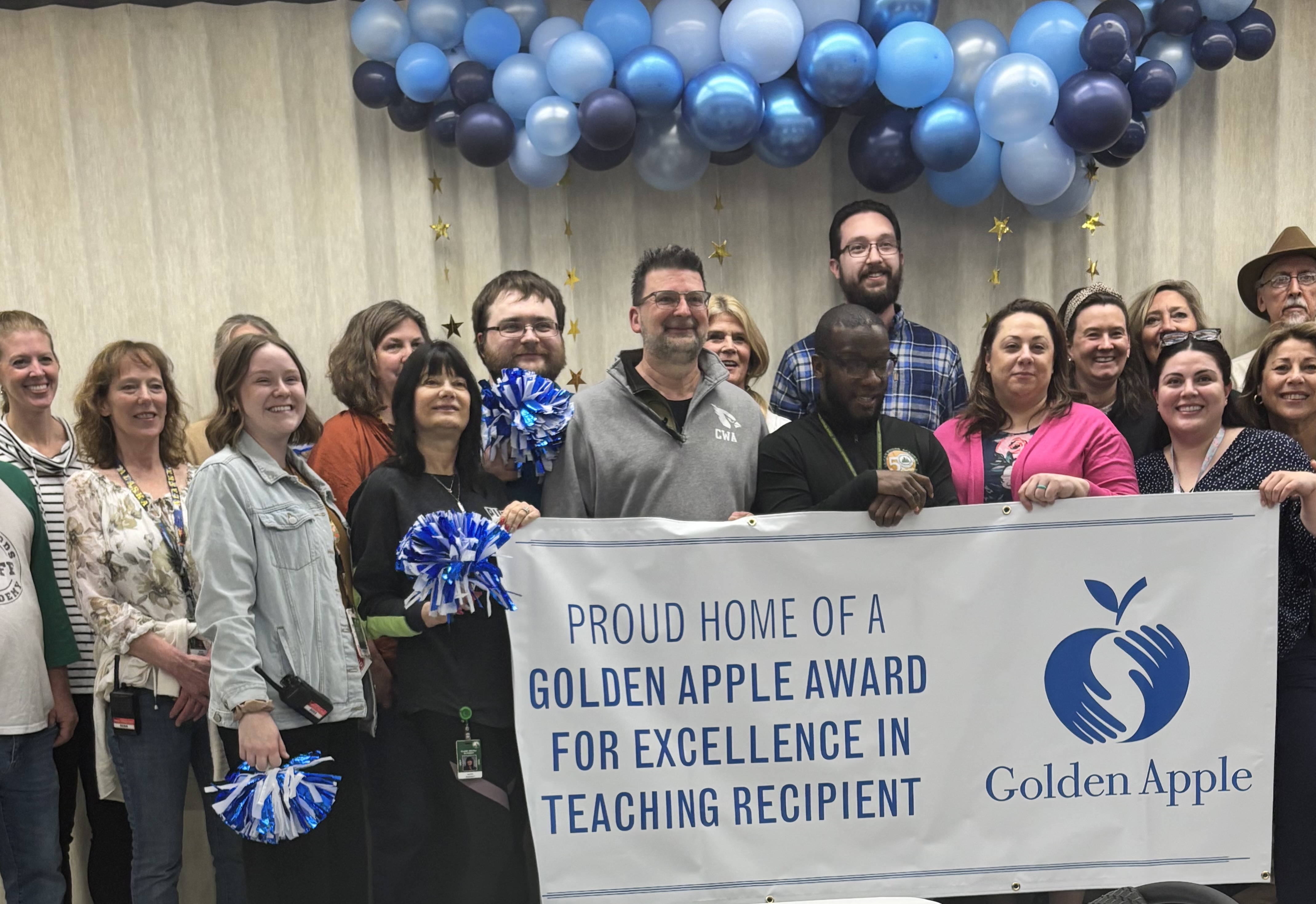James Rowe, M.S.Ed. '99, Earns Prestigious Golden Apple Award
By Lia Kizilbash Gillet
 James Rowe, '99, M.S.Ed., (center, grey shirt) earns Golden Apple Award. His son, Graeme, an academic assistant, stands just behind Rowe. (Photo: NIU Foundation)
James Rowe, '99, M.S.Ed., (center, grey shirt) earns Golden Apple Award. His son, Graeme, an academic assistant, stands just behind Rowe. (Photo: NIU Foundation)James Rowe, M.S.Ed. '99, a committed special education science teacher at Clare Woods Academy in Wheaton, Illinois, earned the prestigious Golden Apple Award for Excellence in Teaching in June 2025.
“This is a wonderful honor. I don't feel like I have done anything special to deserve it,” said Rowe. “I work in a school with so many outstanding teachers, paraprofessionals and staff. I would not have received this nomination if it weren't for them. We all work together to be there for our students. It’s a validation of the staff at Clare Woods Academy.”
Rowe describes Clare Woods Academy, a non-profit alternative day school for special needs students, as "outstanding" and "a place where students accomplish great things."
He said, “When a school is not able to meet the needs of a student in their setting with modifications and support, they send them to us. We work to help students succeed in school when a regular education school doesn’t work.”
Rowe’s son, Graeme, is also an educator at Clare Woods Academy. He works as an academic assistant, supporting students in their learning. His wife, Dr. Patricia Mannion Rowe, who earned three master's degrees and her Ed.D. from NIU, is also a special education teacher specializing in teaching science at York High School in Elmhurst, Illinois.
“When I first learned about the Golden Apple Award nomination, I thought the email was a phishing attempt and deleted it,” said Rowe. “I really wanted it to be real, so I took a picture of it and sent it to my son. He sent it to my wife, who looked up the sender and said it was real. I am so glad I didn’t empty the trash!”
Finding Perspective
James Rowe was born in Kampala, Uganda, but grew up in Evanston, Illinois. His father, John, a New Yorker, met Rowe's mother, Mary, a native of London, at the University of Cambridge. John was working on his Ph.D. in African history. They married and moved to Uganda for John's research. James and his brother, Adam, were both born there. In 1970, the family moved to Evanston, Illinois, where John taught at Northwestern, and Mary raised their sons while working as a social worker.
“I was extremely fortunate,” said Rowe. “I was able to attend Martin Luther King Jr. Laboratory School in Evanston. This school was built in the Black community and was given top funding, cutting-edge equipment, and the best and brightest teachers. White families had to apply to attend the school. If they were accepted, their children were bused to school. Talk about progressive ideas, right?”
Rowe began teaching while attending Evanston Township High School, but had not yet discovered teaching as a career path. On Saturdays, he volunteered at the high school to teach young children how to swim. Joe Dunn was his first teaching mentor, as he helped Rowe to develop and refine a hands-on approach to teaching.
“I would share with John and Mary, my parents, all about the lessons and my students’ successes,” said Rowe. “They would ask me if I wanted to be a teacher while we had tea and ate lunch together. I always responded, ‘I can’t be a teacher, that’s too hard.’”
Classroom and Experiential Education
Impactful high school teachers Dorothy Saw and Bill Branch taught Rowe that people are stronger when they welcome and embrace different people, cultures and religions. He encountered equally strong teachers while attending Earlham College in Richmond, Indiana, where he double-majored in sociology and anthropology, as well as African and African-American studies.
“Steve Nussbaum taught me that the meaning of things could be questioned,” said Rowe. “Professor Steve Butler introduced me to contextual thinking, Paul Robeson and African-American culture. Professor Frank Chiteji taught me about African history and the diaspora. Cathy Winkler showed me how to travel to another country and embrace the language, culture and beliefs of the people you are visiting.”
For three months, Rowe studied abroad in Kenya, living with a family in Tiriki, a village about ten miles from the Ugandan border. They had no running water, no electricity, and no paved roads. He saw firsthand their struggles with health and education.
“I attended the funeral of a two-month-old baby who died of dysentery. I learned that this neighboring family did not have enough money to pay for the medicine their child needed. It was devastating to learn that fifty cents could have saved this child’s life.”
“My host family was only able to pay for school for their two oldest male children while the other ten stayed home and worked on the family farm,” said Rowe.
Notably, when he later shared this difficulty with his parents, they offered to help the host family pay the tuition so the other children could attend school. This reinforced for James the importance of supporting others in their education.
Rowe married Patricia Mannion and they moved to Pittsburgh, Pennsylvania, so Patricia could pursue a master's degree in geology at the University of Pittsburgh. They then moved to Rochelle, Illinois, to pursue graduate degrees at NIU. James' master's thesis was on the breakdown of the Ugandan social structure as a result of the AIDS epidemic and twenty years of civil war.
“The topic was both fascinating and depressing when one contemplated the loss of life,” he said. “I eventually talked to my thesis advisor about how disheartening the research had become. He suggested taking some education classes for fun, and I enjoyed them so much that I changed my major and got an M.S.Ed. in special education.
A Student for Life
Today, Rowe still enjoys learning new things. Through ongoing professional development, he has gone 500 feet underground to observe a working coal mine in Southern Illinois, learned about the Illinois aggregates industry, toured a local water reclamation district facility, learned about flood control, studied sustainable agriculture, and visited an active oil field and refinery. He says that being able to share his experiences with his students and apply the information in lessons makes learning far more interesting and engaging.
“I am a reflection of my life’s experiences and the nurturing support I have received from my teachers, friends, family and especially my wife,” said Rowe. “I am and have always been awestruck by my wife. She is a truly outstanding educator and is a National Board Certified Teacher. She discovered while teaching college courses as a graduate student at NIU that science had not been truly accessible to some high school students. She shifted her career path to high school teaching and became certified in both special education and multiple sciences. We both teach special education and science. We bounce lesson and lab ideas off each other and discuss successful modifications for students to use in class.”
Clare Woods Academy has become Rowe’s second home and his extended family.
“Clare Woods' students, well, all students, are our children. They’re our future. I hope I can help our children succeed.”
